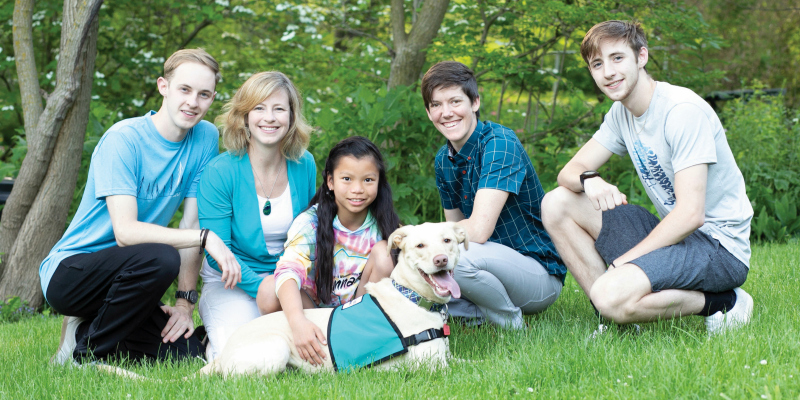By Hywania Thompson | Photographed by Shanna Wolf
For many of us, our family isn’t complete without at least one pet. In fact, nearly 57% of American households own a pet—usually a dog or cat, with higher numbers found in rural states, according to the American Veterinary Medicine Association. Wisconsinites have one of the highest rates of cat ownership in the country, at 32%, the association reports.
And studies continually show that pets are good for us, mentally and physically. They often inspire us to exercise; dog owners are far more likely than non-dog owners to take regular walks, for example. Rescue dogs have helped rehabilitate prisoners and comforted military veterans. Working dogs find us when we’re lost and save us from danger.
Animals give us unconditional love and often seem to sense when we’re troubled. One recent study found that dogs mirror their owner’s stress and anxiety levels, an indicator of how close these human-animal relationships are. Pets are often the first ones who run to greet us at the door and the ones we fall asleep beside at night. In short, they’re part of the family.
With the help of the Madison-based Underdog Pet Rescue of Wisconsin, BRAVA asked three local families to share how their pets became integral and nurturing parts of their daily lives. And how their compassion helped save pets who might otherwise not have survived.
Sylviah and Appa
Eleven-year-old Sylviah Seeliger and her dog, Appa, were made for one another. Sylviah spent her first two years at an orphanage in China before being adopted by Elizabeth Seeliger. Sylviah arrived in Wisconsin with severe separation anxiety and was unable to sleep through the night.
Appa, found on the street as a puppy, was malnourished and had poor vision, and ended up being fostered by a volunteer for Underdog Pet Rescue.
“These two souls were clearly well matched, right down to their early neglect and trauma history,” says Seeliger. After a conversation about Sylviah’s struggles, Seeliger and a friend—an Underdog volunteer—discussed the possibility of a dog that could help give Sylviah some emotional support.
It was almost a year before the right dog came along, and he came at a difficult time in Seeliger’s life. “I was in the middle of a divorce, my finances were strapped and I was leaving the state on a business trip,” says Seeliger. But Seeliger’s friend convinced them to meet the little yellow pup.
When they met, Sylviah watched from afar as the puppy played with another dog. Then the puppy stopped playing, climbed into Sylviah’s lap and fell asleep. Seeliger says, “I saw Sylvie’s typically rigid body soften and a smile light up her face.” She began to think the puppy would be a great fit for their family but there were barriers—finances and her upcoming trip.
Days later, Seeliger’s friend sent her a message saying the hurdles were gone. Underdog had received a donation and all adoption fees were being waived for pets adopted that Saturday. Seeliger’s friend offered to keep fostering the puppy until she returned from her trip. “All the barriers had been magically eliminated,” Seeliger says, “we took it as a sign that this was indeed the puppy we had been waiting for.”
It was Sylviah’s job to name the pup and to be his principal caretaker. She chose to name him Appa after the flying bison character in her favorite cartoon “Avatar: The Last Airbender.” Much like the character he’s named after, Appa gives Sylviah and her family unconditional love and support, sensing when one of Sylviah’s older brothers is upset, or wrapping around Sylviah like a glove.
“While at first glance, we’re working to save lives of the animals, very often we hear that the animals who a volunteer fostered or who a community member adopted really saved them, or greatly improved the human’s lives,” says Underdog Executive Director Lauren Wojtasiak.
Sylviah now sleeps through the night and is a “happier and more well-adjusted child overall,” her mom says. Appa, Sylviah says, gave her hope. “He gives me comfort on scary nights and in scary situations,” she says.
Stacy and Peanut
When Stacy Harbaugh first saw photos of Peanut, who was in an Alabama animal shelter, the diminutive cat had no hair on its tail end and had red, puffy lips caused by ulcers in her mouth.
Even though most kittens get adopted pretty quickly, Peanut’s medical issues dissuaded rescuers. Harbaugh, who’d been fostering animals for Underdog Pet Rescue after her 13-year-old cat Schulie died, first saw the kitten on Underdog’s private Facebook group. The cat was named Hot Lips Houlihan, after the character in the TV comedy “M*A*S*H.” The kitten was suffering from eosinophilic granuloma, an inflammatory condition which caused the mouth ulcers, and her hair loss was due to flea bites. She’d need a lot of veterinary attention.
As the time passed and Hot Lips wasn’t rescued, Harbaugh says there just seemed to be something special about the cat, which had distinctive stripes and patches. She decided she’d take the leap and foster her.
“She’s kind of brown and kind of gray. She’s a very petite cat,” says Harbaugh, who began calling the kitten Peanut because of its size. When the kitten responded to the name, Peanut stuck.
Over time, Harbaugh grew attached to Peanut. But as a volunteer foster, Harbaugh’s job was to promote Peanut’s adoption. “The goal is to get animals through the system and into loving homes,” she says. Harbaugh posted on Facebook about Peanut but the longer Peanut stayed in her home, the more they bonded. Finally, in April, Harbaugh decided to keep Peanut. Another volunteer offered to pay the adoption fees.
Harbaugh didn’t think she would bond with another animal after losing Schulie but says Peanut is the best cat—she’s sweet, friendly and reminds Harbaugh to slow down. Peanut’s condition is being managed with medication, which she may need for the rest of her life. Harbaugh says, “She’s not the easiest animal to care for but she’s definitely the easiest animal to love.”
Laura and Gail and Charlie
Laura Novak and her partner, Gail Campbell, wanted an adult, female dog. And Novak, who owns her own massage therapy business, wanted a dog with a personality that allowed her to take it to work. Last September, a friend recommended they fill out an application with Underdog and wait for their dream dog.
They met a dog named Charlie who checked everything off their list, but later, Underdog contacted them about another dog—also named Charlie—an 8-month- old black lab mix. They weren’t interested in a puppy.
One Saturday, Novak was having a rough day and they changed their minds and decided to go to a meet and greet for Charlie the puppy. “He was just chilling out,” says Novak. “Oh, this is not what I was thinking about a puppy,” she says. They later met at the dog park with Charlie and Patti Manier, a volunteer who was fostering the pup, and brought along Campbell’s chocolate lab, Gretchen. The next day, Manier brought Charlie to Novak and Campbell’s house for another test drive and the deal was sealed. That night, they picked him up.
Charlie was found in a ditch in Georgia. He was emaciated, he had a condition that causes severe pain in his jaw, he had fleas and ehrlichia, a tick- borne illness.
Many of Underdog’s rescue animals come from overcrowded shelters in the South. They face euthanasia at higher rates because adopters are in short supply. Underdog can scoop those animals up and place them with one of its 200 volunteers in Wisconsin until the animal can be adopted out. In 2018, Underdog helped more than 1,000 animals get adopted—most of them dogs and cats.
The couple initially didn’t want to take on a dog who was on medication and sought advice from friends and family who are veterinarians. But the little black dog won them over.
“We just kind of took it on because we loved him,” says Campbell. Novak and Campbell gave Charlie “dog ibuprofen” but eventually weaned him off of it. Novak also used massage to help Charlie’s jaw, which
is better now. “He hasn’t exhibited any pain; he’ll chew on chew toys for hours and play tug-of-war for a really long time,” says Novak. Charlie does have occasional flare ups from the ehrlichia.
The couple has no regrets about rescuing Charlie. “Dogs can complete your life,” says Novak. “I always jokingly tell Gail, now I understand what it’s like to have a child because that’s how I feel about him.”
Because of Charlie, Novak and Campbell have been getting out more. They say it’s been fun see- ing him experience things for the first time. “He’s a real good reminder to just slow down and enjoy it all,” says Campbell.




